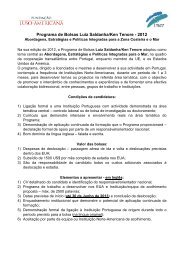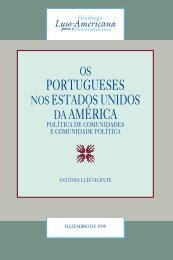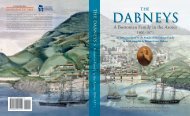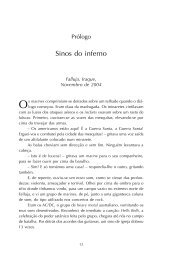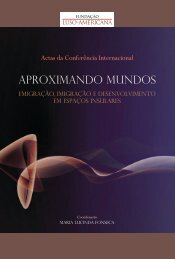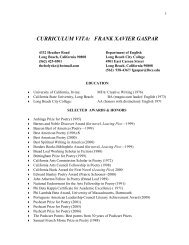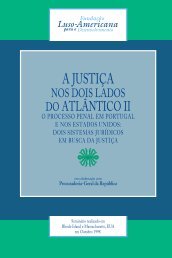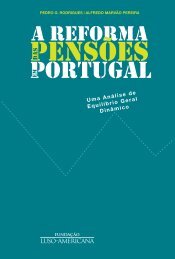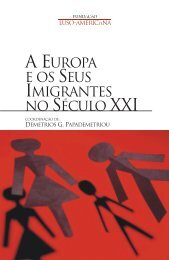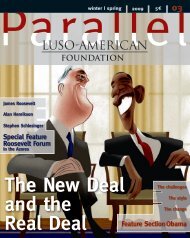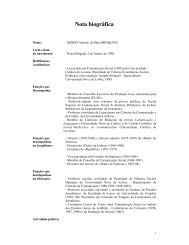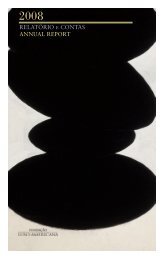A decade later - Fundação Luso-Americana
A decade later - Fundação Luso-Americana
A decade later - Fundação Luso-Americana
Create successful ePaper yourself
Turn your PDF publications into a flip-book with our unique Google optimized e-Paper software.
Carlucci versus Kissinger<br />
The US and the Portuguese<br />
revolution<br />
Bernardino Gomes<br />
and Tiago moreira de sá<br />
Dom Quixote, 2008<br />
84<br />
The Portuguese<br />
viewed by<br />
the Americans<br />
By e. muJAL-Leon<br />
The Department of Government and the<br />
BMW Center for German and European<br />
Studies at Georgetown University had the<br />
pleasure of hosting a presentation of the<br />
book Carlucci versus Kissinger written by<br />
Bernardino Gomes and Tiago Moreira de<br />
Sá. Also in attendance at the book party<br />
were former US ambassador to Portugal,<br />
Elizabeth Bagley and the current ambassador<br />
of Portugal to the United States<br />
Nuno Brito, as well as a representative<br />
from the <strong>Luso</strong>-American Development<br />
Foundation, Miguel Vaz. It was our very<br />
special privilege on this occasion also to<br />
count with the presence of one of the<br />
protagonists of this book, Ambassador<br />
Frank Carlucci.<br />
Carlucci versus Kissinger is an important,<br />
original, and timely book. Not only does<br />
it remind us of how much was at stake<br />
in those crucial years in Portugal, it also<br />
provides the reader with a perceptive<br />
and thorough account of the Revolution,<br />
the actions of the leading actors and<br />
groups, and the extraordinary transition<br />
to democracy that followed from it.<br />
Other histories have been written about<br />
this period. Two things are unique about<br />
the contribution Carlucci versus Kissinger<br />
makes. First, the book offers a compel-<br />
BooK revieWs<br />
‘ nearly forty years <strong>later</strong>,<br />
this book casts a bright light<br />
on the significance of the<br />
portuguese revolution<br />
and it tells the powerful story<br />
of a nation’s struggle<br />
for democracy.<br />
’<br />
ling analysis of the Portuguese Revolution<br />
as viewed from Washington by US foreign-policy<br />
makers. Second, it provides<br />
us with an intimate account of the<br />
debates that took place within the US<br />
government and of the differences that<br />
developed between Henry Kissinger and<br />
Frank Carlucci over how to respond to<br />
Portuguese events.<br />
Nearly forty years <strong>later</strong>, this book casts<br />
a bright light on the significance of the<br />
Portuguese Revolution and it tells the<br />
powerful story of a nation’s struggle for<br />
democracy. Who could have imagined<br />
that a small country on the European<br />
periphery would awaken from the slumber<br />
of a nearly fifty-year dictatorship,<br />
fend off the efforts of radicals within<br />
the Armed Forces Movement and in the<br />
Communist Party to install a “popular”<br />
democracy, and, then, in a few short<br />
years assume its democratic destiny? This<br />
historic process led one of the major<br />
figures in American political science, the<br />
late Samuel Huntington, to identify the<br />
Portuguese Revolution as the birthplace<br />
for the Third Wave which would in the<br />
space of two <strong>decade</strong>s sweep aside dictatorships<br />
in Southern and Eastern<br />
Europe as well as Latin America.<br />
Carlucci versus Kissinger helps us understand<br />
why Portugal was at epicenter of<br />
world politics during the mid- and late<br />
1970s. The future configuration of<br />
European security and the role of the<br />
Atlantic Alliance hung in the balance<br />
during the Portuguese Revolution. So<br />
did the shape of decolonization in<br />
Southern Africa. Even the Cold War and<br />
the balance of power between the United<br />
States and the Soviet Union would be<br />
deeply influenced by the successful<br />
struggle for democracy in this small<br />
country.<br />
This book offers a penetrating analysis<br />
of US foreign policy during a tumultuous<br />
period, and it underscores the importance<br />
of leadership in political processes.<br />
Too often historians and political<br />
scientists focus on broad and structural<br />
processes. This book reminds us that it<br />
is individuals who make history. Any one<br />
interested in how US foreign policy is<br />
made should read this book. Its documents<br />
and interviews provide a gold<br />
mine of information. The book presents<br />
the riveting story of two major figures<br />
in the US foreign policy establishment<br />
(Henry Kissinger and Frank Carlucci),<br />
their clashes and differences of opinion<br />
toward events in Portugal.<br />
Parallel no. 6 | FALL | WINTER 2011



